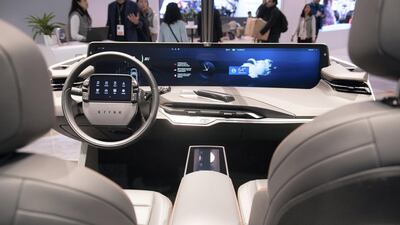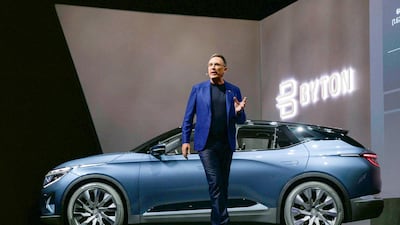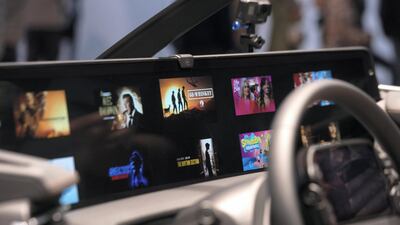Sliding behind the wheel of the Byton M-Byte is like being wrapped in a smartphone. A 48-inch screen spans the length of the dashboard and the steering wheel is taken over by a touchscreen.
The concept SUV, sat in a dark corner of an Abu Dhabi hotel parking lot last week, was here to sell the Byton founders' vision of a 'smart device on wheels' to potential sales partners, investors and technology co-developers in the UAE.
"The UAE is the right place for Byton to be, absolutely," co-founder and chief executive Daniel Kirchert told The National. "The infrastructure is one of the best in the world and the leadership here has a vision [for electric vehicles and renewable energy]."
The Chinese electric vehicle start-up will see the first 150 M-Byte SUVs roll off its new production line in Nanjing, China by the end of this year, Mr Kirchert said, heading for Chinese driveways – the first fulfilled orders out of 60,000 reserved globally.
The brand, which launched in 2017, is taking on a formidable foe in Tesla, which sold the most popular electric vehicle in the world, the Model 3, in 2019, nearly triple the sales of its next closest rival, the BAIC EU-Series. The Model 3, priced at $50,000 (Dh183,625), is a touch more expensive than the M-Byte, which has a starting price of $45,000.
A car manufacturer would have to invest nearly $75 billion to make a place for itself in all of the breakthrough technology Byton is hoping to lead on: autonomous driving, 5G mobile connectivity, electrification and car sharing, according to a 2019 study by McKinsey. It cautioned that "while the new technologies will doubtless generate enormous value, no one can say where the economic profit will flow – or when".
Mr Kirchert is willing to take the chance.
The German entrepreneur cut his teeth at BMW and Infiniti and said the rise of the iPhone is a cautionary tale for the automotive market. He believes legacy brands are not ready for the massive shift in car trends, which will be electric, 5G-enabled and increasingly reliant on services customers are most accustomed to getting from their phones, like facial recognition, content streaming and health insights.
He imagines a day, "five to ten years from now", when cars are autonomous and a passenger can hop into a Byton, either their own, a friend's or hailed from an app, and the tablet in front of them will recognise their face and adjust the home screen to their preferences.
If they are running low on their step count for the day, for example, the car recommends a safe drop-off point about 600 metres from their next meeting.
While the exterior of the Byton M-Byte does not cut a distinctive figure next to a Range Rover and a couple of Teslas in the Abu Dhabi lot, the experience inside is a different story.
Most of the knobs and dials are gone, replaced by touchscreens, and the front seats swivel slightly toward each other – a nod to the day when the driver's seat will be for just another passenger, and conversation or video streaming will replace eyes on the road.
The massive dashboard screen, dubbed 'Byton Stage', will stream shows and movies when in 'cinema mode' and perhaps, hopefully, reinvent the Powerpoint presentation when stuck in 'office mode'.
To achieve these offerings, earlier this month Byton announced partnerships to bring content to its cars, including with media giant ViacomCBS, weather service AccuWeather, Aiqudo, Cloud Car, Road.Travel and Xperi.
Access Twine is the platform that Byton will use to deliver the content to the car's screens; Cloud Car will handle the cloud-connected natural language recognition; Aiqudo’s Voice to Action platform enables customers to use voice commands and integrates with the mobile apps on their smartphones. Road.Travel lets users plan and book trips. The platform is also open to developers with Byton aiming to have localised offerings in their various markets.
Byton's team of 1,600 – many former Tesla and Apple employees – speak to a globalised economy. Prototyping and engineering largely happens in Munich, Germany, while technology like facial recognition is being developed by a team in Silicon Valley and mass production of the vehicle will occur at its $1.7bn factory in Nanjing, which it built through Chinese government support and subsidies, according to a company spokesman.
The company is now looking to diversify its shareholder base, aiming to close a $500 million Series C round in 2020 – something it struggled to achieve in 2019 – with investors from North America, Europe and the Middle East.
Alongside regional investors, Byton is also courting potential distribution partners in the UAE in order to make the car available here, as well as tech partners who can tailor offerings to Arabic-speaking and expatriate audiences.
“I would say that any electric vehicle to be launched in the market has the potential to capture new market share that hasn’t even been touched yet," said Ben Pullen, the co-founder and chief executive of Generation.e, a UAE smart mobility company. "In most parts of the world the number of electric vehicles on the road could be much higher if there was sufficient amount of supply and choice. We’re not suffering from lack of demand, it’s a lack of supply.”
For now, major hurdles to wider EV uptake in the UAE include limited choice and no way for homeowners or apartment dwellers to install their own charging stations where they park. This has hamstrung the charging network.
But at-home charging stations would be a "golden bullet solution", Mr Pullen said. "After all, charging our vehicle at home or the office is the dream choice when it comes to powering up our vehicles – whether petrol or electric."







